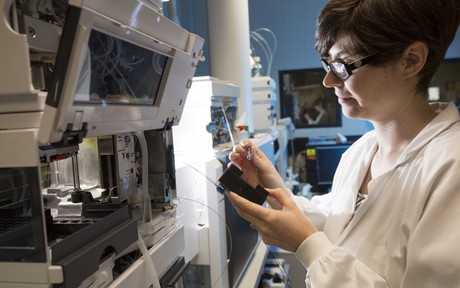Macquarie brings proteomics expertise to Cancer Moonshot program

Macquarie University has signed a memorandum of understanding (MoU) with the US National Cancer Institute, which will see the organisations work together on the Cancer Moonshot initiative to help drive further momentum into critical cancer research.
Macquarie was selected to be a part of Cancer Moonshot based on its expertise in proteomics (the university houses the world’s first proteomics facility) and advancements it has made with respect to the appropriate treatment of patients with melanoma and colorectal cancer. This proteogenomics (genomics plus proteomics) program will save lives by earlier detection, as well as predicting more appropriate treatment of cancer patients.
“It is our intent to accelerate our world-class proteomics research for the benefits of the millions of cancer sufferers around the world,” said Professor Sakkie Pretorius, Macquarie’s deputy vice-chancellor research. “Macquarie University continues to lead the way with our research in this field thanks to the Australian Proteomics Analysis Facility (APAF) and the Macquarie University Health Sciences Centre, which brings together world-class clinical care, teaching and translational research with the aim of improving personalised patient outcomes and driving innovative medical advancements.”
Macquarie University will work in close collaboration with the Australian members of Cancer Moonshot, including Bioplatforms Australia, the Children’s Medical Research Institute, the Garvin Institute of Medical Research, the Australian Cancer Research Foundation, as well as current collaborators the Concord Repatriation General Hospital, Melanoma Institute Australia, Cancer Institute NSW, Cancer Council NSW and the National Health and Medical Research Council.
Retinal health linked to dementia risk, study shows
Researchers have discovered that the blood vessels at the back of the eye — called retinal...
Pancreatic cancer hijacks metabolism switch to help it spread
Pancreatic cancer hijacks a molecule known for regulating physiological processes, such as food...
Novel antibiotic activates 'suicide' mechanism in superbug
Researchers have discovered a new class of antibiotic that selectively targets Neisseria...




